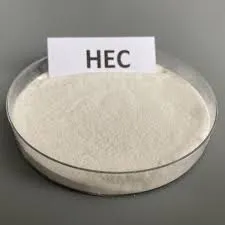
Dis . 22, 2024 22:04 Back to list
methyl hydroxyethyl cellulose manufacturers
Methyl Hydroxyethyl Cellulose Manufacturers A Comprehensive Overview
Methyl Hydroxyethyl Cellulose (MHEC) is a widely utilized cellulose derivative that finds applications across various industries, including construction, pharmaceuticals, food, and cosmetics. The increasing demand for eco-friendly and versatile materials has significantly bolstered the market for MHEC, prompting a rise in manufacturers specializing in its production. This article delves into the key aspects surrounding MHEC manufacturers, including their production processes, applications, and market trends.
Understanding Methyl Hydroxyethyl Cellulose
MHEC is a non-ionic, water-soluble polymer derived from cellulose, which is naturally obtained from the pulp of trees. The methyl and hydroxyethyl groups are introduced to enhance properties such as solubility, viscosity, and overall performance in various applications. One of MHEC's most attractive features is its ability to form gels and films, making it suitable for numerous formulations.
Manufacturing Process
The production of MHEC typically involves several critical steps
1. Cellulose Extraction The process begins with the extraction of cellulose from natural sources, generally from wood pulp.
2. Etherification The extracted cellulose undergoes etherification through a chemical reaction with methyl chloride and ethylene oxide. This step modifies the cellulose structure to create MHEC.
3. Purification The resulting MHEC needs to be purified to remove any unreacted chemicals and by-products to ensure it meets industry standards.
4. Drying and Milling Finally, the purified MHEC is dried and milled into a fine powder, which can then be packaged for distribution.
Manufacturers often invest in state-of-the-art machinery and technology to ensure efficiency and quality control throughout the production process.
Applications of MHEC
methyl hydroxyethyl cellulose manufacturers

MHEC has a broad range of applications, making it a versatile ingredient in many products
- Construction In the construction sector, MHEC is used as a thickener and water-retaining agent in cement and mortar mixtures. It enhances workability and improves adhesion, while also regulating the drying process.
- Pharmaceuticals MHEC is employed as a binder and thickener in the formulation of medicines. Its non-toxic nature makes it suitable for use in various pharmaceutical products, including gels and capsules.
- Food Industry In the food sector, MHEC acts as a stabilizer, thickener, and emulsifier. It is commonly found in products like salad dressings, sauces, and dairy items, where it helps improve texture and consistency.
- Cosmetics and Personal Care MHEC is a popular ingredient in cosmetic formulations, providing a smooth texture and enhancing the stability of creams and lotions.
Market Trends
The global market for MHEC is experiencing significant growth driven by increasing consumer awareness regarding sustainability and the demand for natural products. The shift towards eco-friendly building materials in the construction industry is also a key factor propelling this market forward.
Moreover, the COVID-19 pandemic has heightened the importance of hygiene and sanitation, leading to increased demand for MHEC in disinfectant formulations and personal care products. Manufacturers are reacting to these trends by innovating their product lines, focusing on quality, and ensuring compliance with regulatory standards.
In addition, the rise of e-commerce has expanded the reach of MHEC manufacturers, allowing them to cater to a more extensive range of customers globally. This trend is likely to continue, fostering competition and encouraging manufacturers to enhance their product offerings.
Conclusion
Methyl Hydroxyethyl Cellulose manufacturers play a critical role in supplying various industries with high-quality, versatile materials that meet the growing demands of consumers and companies alike. With ongoing advancements in production techniques and a keen focus on sustainability, the future of MHEC appears promising. As industries increasingly adopt eco-friendly practices, the reliance on synthetic alternatives may decrease, further emphasizing the importance of natural derivatives like MHEC in enhancing product quality and performance. As the market evolves, MHEC manufacturers are well-positioned to meet these challenges and contribute to a greener and more sustainable future.
-
Versatile Hpmc Uses in Different Industries
NewsJun.19,2025
-
Redispersible Powder's Role in Enhancing Durability of Construction Products
NewsJun.19,2025
-
Hydroxyethyl Cellulose Applications Driving Green Industrial Processes
NewsJun.19,2025
-
Exploring Different Redispersible Polymer Powder
NewsJun.19,2025
-
Choosing the Right Mortar Bonding Agent
NewsJun.19,2025
-
Applications and Significance of China Hpmc in Modern Industries
NewsJun.19,2025







